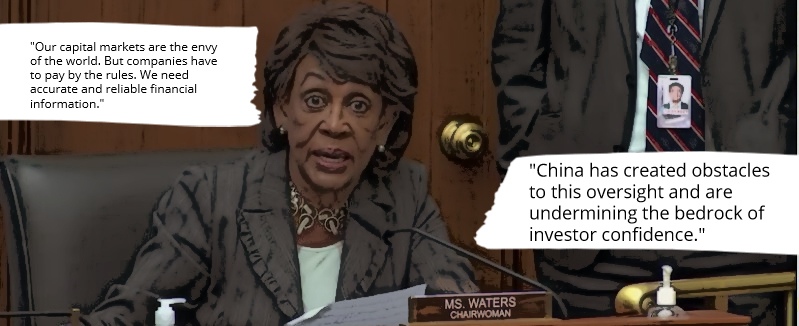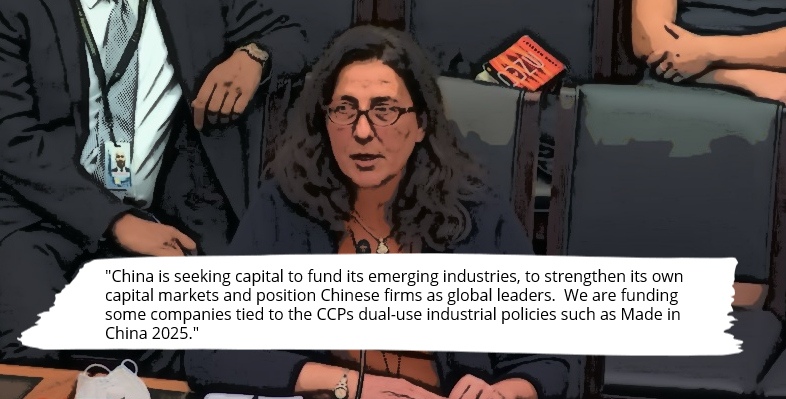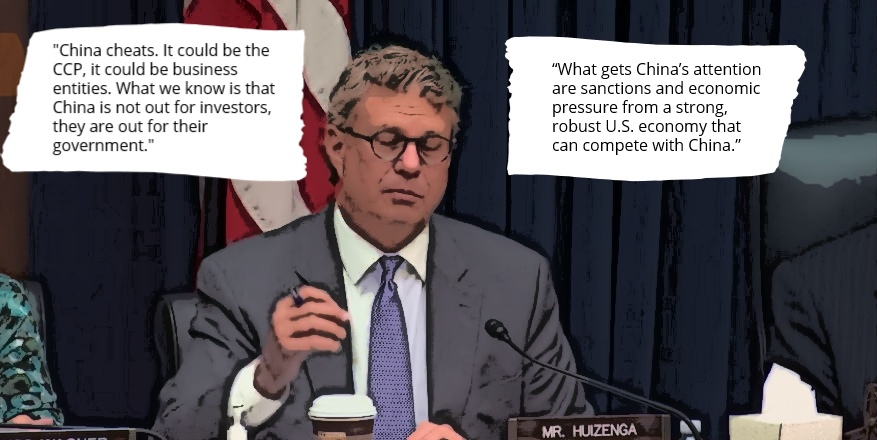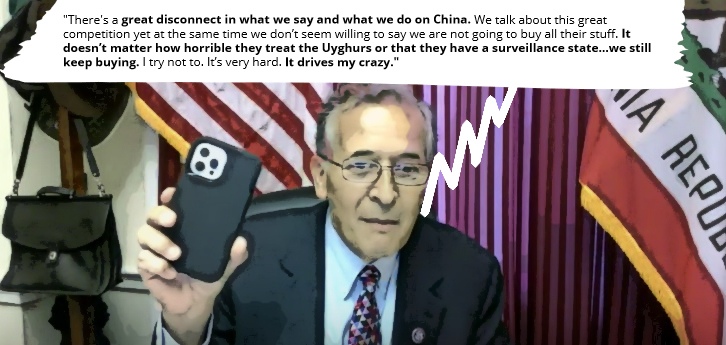The House Financial Services Committee’s Subcommittee on Investor Protection, Entrepreneurship and Capital Workers heard from four witnesses on Tuesday to discuss the way forward on China’s access to Wall Street. The debate largely centered on investor risks in China and whether banning Americans from investing in certain Chinese companies, both here and abroad, or sanctions were the better tool.
“When you have a company on the Entity List that cannot be sold technologies to build up its military capabilities but yet investors can invest in them…that is a significant gap to enforce any policy goals,” said Claire Chu, senior analyst at RWR Advisory Group. “Companies that are sanctioned are also allowed access to the U.S. market.”
It’s not just the Entity List, which is managed by the Department of Commerce and requires U.S. companies to get permission before they can sell computer hardware or other types of equipment to the companies listed. Huawei is the most famous name on Commerce’s Entity List.
It could also be Withhold Release Orders (WROs) imposed by Customs and Border Protection (CBP). Those WROs are based on labor rights abuses – right now prevalent in the Chinese province of Xinjiang. For example, on June 24, Customs issued a WRO against Hoshine Silicon Industry.
But just because there was a WRO or a warning on doing business with Hoshine, it does not mean there was a prohibition on U.S. capital flowing to Hoshine.
As of August 31, Vanguard owned Hoshine in two of its mutual funds.
Not that this was illegal for Vanguard in this case. Vanguard, however, has been a seller of some 50 Chinese companies banned from U.S. capital markets as of August 2. All of the companies in question were defense contractors.
Still, it shows how hard it is to exorcise China from Wall Street investment firms. Even bans on doing some business due to forced labor are not enough of a turnoff for Wall Street investors.
The Public Company Accounting Oversight Board (PCAOB), created by the Sarbanes–Oxley Act of 2002 to oversee audits of public companies listed on the NYSE and Nasdaq, has failed to convince Chinese companies to comply with its rules. Every other country complies. China is a standout. Beijing claims state secrets for blocking access to company financials.
Chairman Brad Sherman (D-CA-30), the author of the House version of the Holding Foreign Companies Accountable Act, saved one of his best comments for last.
“Nothing is going to change China’s behavior except across-the-board tariffs on their entire economy,” he said during his closing remarks. “Yes, we have had accounting fraud in the United States. I was here for Enron and WorldCom. That’s why we passed Sarbanes Oxley and that’s why we have the PCAOB,” he said. “Alibaba Cayman Islands doesn’t belong in the indexes. You’re not even a company. I don’t know what you are,” he said of China’s use of Variable Interest Entities (VIE)– offshore shell companies that own holding companies that own shares in the big China companies most people believe they are invested in directly, but often they are not.

Chairwoman of the House Financial Services Committee, Maxine Waters.
Chinese companies do not comply with U.S. securities laws, said witness Samantha Ross, Founder of AssuranceMark and a former chief of staff at the PCAOB. “I gained firsthand knowledge of fraud by these public issuers. The PCAOB is required to inspect the work of auditors to make sure it complies with Securities and Exchange Commission standards. But they cannot do that in China and with companies listed in Hong Kong, either. China is the only government that blocks us.”
Former President Trump signed the Holding Foreign Companies Accountable Act into law on December 18, 2020. China’s delisting of non-compliant firms is essentially already underway as they have two years to provide audited financials no different than the Russians, Indians and Brazilians do, including with their state-owned enterprises.
A Dysfunctional ‘Partnership’
Some on Wall Street, and on Capitol Hill, might call the U.S. China relationship a partnership. Increasingly, however, including in the Biden White House, it is referred to as a rivalry. Relationships where the two partners are rivals, at each other’s throats, end in divorce (or probably should).
Rep. Sherman highlighted the dysfunction of the U.S.-China relationship, saying the intertwining of the two economies has given China “substantial power” in the U.S. while not giving the U.S. any power in Beijing.
“I represent the movie industry in my district. They only allow 40 movies into China. If you run a studio, you want to be one of those 40,” Sherman said as he ran down his thoughts of the ever-growing China moral dilemma. “You know, if you make a movie about Tibet, that’s not getting into China. Actually, if you made one movie about Tibet, none of your movies is getting into China. If you’re Morgan Stanley, you know that you may be one of the banks that gets licensed in China…if your global index includes Chinese companies to a sufficient degree. You know you’ll be allowed to do business in China if your lobbyist is here on the Hill lobbying for China. Beijing doesn’t need to hire a lobbyist. They have all of them.”
Rep. Sherman also said that there was a “two-way street” between the U.S. and China, with American investment capital flowing there, and Chinese investment capital flowing here. Most of that, however, is in bonds. A lot of it is in private equity and venture capital in Silicon Valley, too.
“If it is going to be a two-way street, we have to make sure it’s a fair street. You’ve heard of Luckin’ Coffee. Evergrande. Didi,” Sherman said of Chinese companies that either went belly up, are in the process of going broke, or are under investigation by the Chinese government, crushing its share value.
Karen Sutter, a specialist in Asian Trade and Finance at the Congressional Research Service, said that the “two-way street” really has one side filled with potholes, roadblocks and detours. That’s the road the U.S. travels upon on the way to China.
China is opening its financial markets to only a few influential firms. Their market participation is controlled by Beijing because the CCP wants China’s state banks to be the dominant market player.
American investment firms like Goldman Sachs and BlackRock that now have carte blanche to go after mainland Chinese investors without a local partner have a small market share. It will never surpass that of native Chinese institutions.
Worse yet, Sutter warned, is that the Chinese government can “exercise control, influence and discretion of every U.S. investment in China. It’s all designed to attract capital to where China’s economy is weak, such as into bad assets and debt. Increased capital flows to China’s debt markets could create investment opportunities for American investors, but it could also create increased risk by exposing U.S. capital to areas where there are systemic market risks.”

Karen Sutter, Congressional Research Service
The Q&A Session: Finding Backdoors
The majority of the Subcommittee membership are skeptical of China. No one trusted them. Wall Street had no real allies, either. Members were concerned with China finding backdoors to capital here, with the help of Silicon Valley and private equity.
Rep. Sean Casten (D-IL-6): “I don’t want to play whack-a-mole. Let’s pretend all the ideas of the Holding Companies Accountable Act work…it seems we still have a gaps, they can come in through exempt offers.”
Samantha Ross agreed. “We need to be concerned that companies that are delisted take advantage of our system and sell securities to other investors in different ways, not following the usual disclosure rules.”
Rep. Van Taylor (R-TX-3) asked if Trump missed any Chinese companies worth sanctioning.
Eric Lorber, Senior Director of the Center on Economic and Financial Power, Foundation for Defense of Democracies in Washington said Trump hit a lot of companies and that he was “not aware” of any companies he missed.
That’s when RWR Advisory’s witness, Chu, chimed in.
“There are hundreds of companies, that includes missile developers, drone makers. There is no updated list on companies since June. We need a consistent updating,” she said.
Rep. Taylor: “I want to see that list. I think Trump did a good job going after Chinese military companies and we want to build on that success.”
Rep. Andy Barr (R-KY-6), who introduced the Chinese Military and Surveillance Companies Sanctions Act in September that expands on the Trump and Biden capital markets sanctions questioned whether Entity List sanctions and capital market sanctions needed to go hand in hand. The general consensus was “yes” and “maybe”, with no clear answer.
Barr noted that MSCI said in August that it would be increasing the number of mainland China stocks, known as the A-shares, in its major emerging market indexes. That means that any exchange-traded fund, or index fund that tracks that index, will then hold those stocks by default, thus increasing capital flows from U.S. investors into China.
Barr: “What if those companies in the indexes get sanctioned? Would they have to be pulled out of the indexes?”
Chu: “It’s unclear. Those factors need to be made clearer so we know how these capital market sanctions can be applied.”

Ranking member of the Subcommittee, Rep. Bill Huizenga.
Sutter said that the role of the state in China’s economy has increased dramatically since 2014 under Xi Jinping. This raises the financial and commercial risks of ties with China for U.S. companies, U.S. Investors and the U.S. more broadly.
“It gives China greater influence over U.S. companies as well as over the global marketplace,” she said.
Sherman reminded investors what they were ultimately supporting in China.
“When you invest in China, you’re investing in a police state…and one that imprisons a million Uyghurs in Xinjiang,” Sherman said.
The full hearing titled “Taking Stock of China, Inc.: Examining Risks to Investors and the U.S. Posed by Foreign Issuers in U.S. Markets” can be found here.

Rep. Juan Vargas speaking during the House Subcommitee on Capital Markets and China on October 26, 2021.
House Capital Markets Committee Tackles Wall Street’s China Ties
The House Financial Services Committee’s Subcommittee on Investor Protection, Entrepreneurship and Capital Workers heard from four witnesses on Tuesday to discuss the way forward on China’s access to Wall Street. The debate largely centered on investor risks in China and whether banning Americans from investing in certain Chinese companies, both here and abroad, or sanctions were the better tool.
“When you have a company on the Entity List that cannot be sold technologies to build up its military capabilities but yet investors can invest in them…that is a significant gap to enforce any policy goals,” said Claire Chu, senior analyst at RWR Advisory Group. “Companies that are sanctioned are also allowed access to the U.S. market.”
It’s not just the Entity List, which is managed by the Department of Commerce and requires U.S. companies to get permission before they can sell computer hardware or other types of equipment to the companies listed. Huawei is the most famous name on Commerce’s Entity List.
It could also be Withhold Release Orders (WROs) imposed by Customs and Border Protection (CBP). Those WROs are based on labor rights abuses – right now prevalent in the Chinese province of Xinjiang. For example, on June 24, Customs issued a WRO against Hoshine Silicon Industry.
But just because there was a WRO or a warning on doing business with Hoshine, it does not mean there was a prohibition on U.S. capital flowing to Hoshine.
As of August 31, Vanguard owned Hoshine in two of its mutual funds.
Not that this was illegal for Vanguard in this case. Vanguard, however, has been a seller of some 50 Chinese companies banned from U.S. capital markets as of August 2. All of the companies in question were defense contractors.
Still, it shows how hard it is to exorcise China from Wall Street investment firms. Even bans on doing some business due to forced labor are not enough of a turnoff for Wall Street investors.
The Public Company Accounting Oversight Board (PCAOB), created by the Sarbanes–Oxley Act of 2002 to oversee audits of public companies listed on the NYSE and Nasdaq, has failed to convince Chinese companies to comply with its rules. Every other country complies. China is a standout. Beijing claims state secrets for blocking access to company financials.
Chairman Brad Sherman (D-CA-30), the author of the House version of the Holding Foreign Companies Accountable Act, saved one of his best comments for last.
“Nothing is going to change China’s behavior except across-the-board tariffs on their entire economy,” he said during his closing remarks. “Yes, we have had accounting fraud in the United States. I was here for Enron and WorldCom. That’s why we passed Sarbanes Oxley and that’s why we have the PCAOB,” he said. “Alibaba Cayman Islands doesn’t belong in the indexes. You’re not even a company. I don’t know what you are,” he said of China’s use of Variable Interest Entities (VIE)– offshore shell companies that own holding companies that own shares in the big China companies most people believe they are invested in directly, but often they are not.
Chairwoman of the House Financial Services Committee, Maxine Waters.
Chinese companies do not comply with U.S. securities laws, said witness Samantha Ross, Founder of AssuranceMark and a former chief of staff at the PCAOB. “I gained firsthand knowledge of fraud by these public issuers. The PCAOB is required to inspect the work of auditors to make sure it complies with Securities and Exchange Commission standards. But they cannot do that in China and with companies listed in Hong Kong, either. China is the only government that blocks us.”
Former President Trump signed the Holding Foreign Companies Accountable Act into law on December 18, 2020. China’s delisting of non-compliant firms is essentially already underway as they have two years to provide audited financials no different than the Russians, Indians and Brazilians do, including with their state-owned enterprises.
A Dysfunctional ‘Partnership’
Some on Wall Street, and on Capitol Hill, might call the U.S. China relationship a partnership. Increasingly, however, including in the Biden White House, it is referred to as a rivalry. Relationships where the two partners are rivals, at each other’s throats, end in divorce (or probably should).
Rep. Sherman highlighted the dysfunction of the U.S.-China relationship, saying the intertwining of the two economies has given China “substantial power” in the U.S. while not giving the U.S. any power in Beijing.
“I represent the movie industry in my district. They only allow 40 movies into China. If you run a studio, you want to be one of those 40,” Sherman said as he ran down his thoughts of the ever-growing China moral dilemma. “You know, if you make a movie about Tibet, that’s not getting into China. Actually, if you made one movie about Tibet, none of your movies is getting into China. If you’re Morgan Stanley, you know that you may be one of the banks that gets licensed in China…if your global index includes Chinese companies to a sufficient degree. You know you’ll be allowed to do business in China if your lobbyist is here on the Hill lobbying for China. Beijing doesn’t need to hire a lobbyist. They have all of them.”
Rep. Sherman also said that there was a “two-way street” between the U.S. and China, with American investment capital flowing there, and Chinese investment capital flowing here. Most of that, however, is in bonds. A lot of it is in private equity and venture capital in Silicon Valley, too.
“If it is going to be a two-way street, we have to make sure it’s a fair street. You’ve heard of Luckin’ Coffee. Evergrande. Didi,” Sherman said of Chinese companies that either went belly up, are in the process of going broke, or are under investigation by the Chinese government, crushing its share value.
Karen Sutter, a specialist in Asian Trade and Finance at the Congressional Research Service, said that the “two-way street” really has one side filled with potholes, roadblocks and detours. That’s the road the U.S. travels upon on the way to China.
China is opening its financial markets to only a few influential firms. Their market participation is controlled by Beijing because the CCP wants China’s state banks to be the dominant market player.
American investment firms like Goldman Sachs and BlackRock that now have carte blanche to go after mainland Chinese investors without a local partner have a small market share. It will never surpass that of native Chinese institutions.
Worse yet, Sutter warned, is that the Chinese government can “exercise control, influence and discretion of every U.S. investment in China. It’s all designed to attract capital to where China’s economy is weak, such as into bad assets and debt. Increased capital flows to China’s debt markets could create investment opportunities for American investors, but it could also create increased risk by exposing U.S. capital to areas where there are systemic market risks.”
Karen Sutter, Congressional Research Service
The Q&A Session: Finding Backdoors
The majority of the Subcommittee membership are skeptical of China. No one trusted them. Wall Street had no real allies, either. Members were concerned with China finding backdoors to capital here, with the help of Silicon Valley and private equity.
Rep. Sean Casten (D-IL-6): “I don’t want to play whack-a-mole. Let’s pretend all the ideas of the Holding Companies Accountable Act work…it seems we still have a gaps, they can come in through exempt offers.”
Samantha Ross agreed. “We need to be concerned that companies that are delisted take advantage of our system and sell securities to other investors in different ways, not following the usual disclosure rules.”
Rep. Van Taylor (R-TX-3) asked if Trump missed any Chinese companies worth sanctioning.
Eric Lorber, Senior Director of the Center on Economic and Financial Power, Foundation for Defense of Democracies in Washington said Trump hit a lot of companies and that he was “not aware” of any companies he missed.
That’s when RWR Advisory’s witness, Chu, chimed in.
“There are hundreds of companies, that includes missile developers, drone makers. There is no updated list on companies since June. We need a consistent updating,” she said.
Rep. Taylor: “I want to see that list. I think Trump did a good job going after Chinese military companies and we want to build on that success.”
Rep. Andy Barr (R-KY-6), who introduced the Chinese Military and Surveillance Companies Sanctions Act in September that expands on the Trump and Biden capital markets sanctions questioned whether Entity List sanctions and capital market sanctions needed to go hand in hand. The general consensus was “yes” and “maybe”, with no clear answer.
Barr noted that MSCI said in August that it would be increasing the number of mainland China stocks, known as the A-shares, in its major emerging market indexes. That means that any exchange-traded fund, or index fund that tracks that index, will then hold those stocks by default, thus increasing capital flows from U.S. investors into China.
Barr: “What if those companies in the indexes get sanctioned? Would they have to be pulled out of the indexes?”
Chu: “It’s unclear. Those factors need to be made clearer so we know how these capital market sanctions can be applied.”
Ranking member of the Subcommittee, Rep. Bill Huizenga.
Sutter said that the role of the state in China’s economy has increased dramatically since 2014 under Xi Jinping. This raises the financial and commercial risks of ties with China for U.S. companies, U.S. Investors and the U.S. more broadly.
“It gives China greater influence over U.S. companies as well as over the global marketplace,” she said.
Sherman reminded investors what they were ultimately supporting in China.
“When you invest in China, you’re investing in a police state…and one that imprisons a million Uyghurs in Xinjiang,” Sherman said.
The full hearing titled “Taking Stock of China, Inc.: Examining Risks to Investors and the U.S. Posed by Foreign Issuers in U.S. Markets” can be found here.
Rep. Juan Vargas speaking during the House Subcommitee on Capital Markets and China on October 26, 2021.
MADE IN AMERICA.
CPA is the leading national, bipartisan organization exclusively representing domestic producers and workers across many industries and sectors of the U.S. economy.
TRENDING
CPA: Liberty Steel Closures Highlight Urgent Need to Address Mexico’s Violations and Steel Import Surge
CPA Applauds Chairman Jason Smith’s Reappointment to Lead House Ways and Means Committee
Senator Blackburn and Ossoff’s De Minimis Bill is Seriously Flawed
JQI Dips Due to Declining Wages in Several Sectors as November Jobs Total Bounces Back from Low October Level
What Are Trump’s Plans For Solar in the Inflation Reduction Act?
The latest CPA news and updates, delivered every Friday.
WATCH: WE ARE CPA
Get the latest in CPA news, industry analysis, opinion, and updates from Team CPA.
CHECK OUT THE NEWSROOM ➔